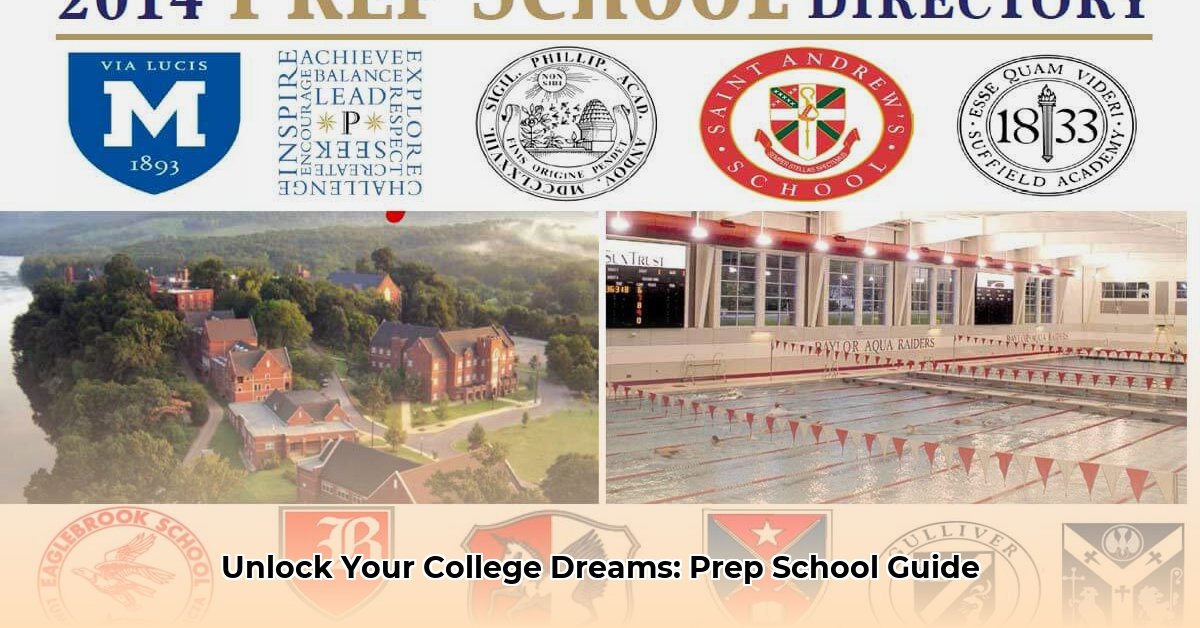Picking the right high school is a huge decision for parents – it significantly shapes a child’s future. This guide offers a comprehensive overview of prep schools, comparing them to traditional high schools to help you determine the best fit for your family. We will explore the unique attributes of prep schools, guide you in identifying the ideal institution, and assess whether the investment is worthwhile. Our exploration will encompass academics, extracurriculars, and financial aspects, empowering you to make the most informed decision for your child.
Understanding Prep Schools and College Readiness
What exactly are prep schools? These are private secondary schools, often called preparatory schools, specifically designed to prepare students for the demands of college. Consider them intensive academic environments focused on equipping students for higher education. Prep schools are not uniform; they vary significantly in their academic rigor, extracurricular offerings, and approach to student development. Understanding these nuances is key to finding the right match.
Day Schools vs. Boarding Schools: A Key Distinction and Social Environment
A fundamental difference lies in whether a school is a day school or a boarding school. Day schools operate similarly to traditional high schools, with students attending classes and returning home afterward. Boarding schools offer a more immersive experience, housing students on campus and fostering a 24/7 learning environment. This promotes independence, self-reliance, and a strong sense of community, as students live, learn, and socialize together. Consider the impact on family dynamics, as boarding school may create distance but also empower students.
The choice depends on your family’s preferences and priorities. Do you value the close daily connection of a day school, or the independence and immersive environment that a boarding school offers? This decision carries significant consequences for your child’s social, emotional, and academic development.
The Curriculum: Enhanced College Preparation and Academic Rigor
What distinguishes prep schools academically? They typically feature a more rigorous curriculum than standard public high schools. Many provide Advanced Placement (AP) or International Baccalaureate (IB) courses, challenging students and building a solid foundation for college-level studies. Furthermore, prep schools often offer specialized programs in areas like STEM, arts, or humanities, allowing students to delve deeper into their passions.
Smaller class sizes enable teachers to offer more individualized attention, enriching the learning experience and potentially improving outcomes. “With smaller class sizes, teachers can give students more individualized attention, making for a richer learning experience and potentially better outcomes,” said Dr. Emily Carter, Educational Advisor at Ivy League Consulting. This personalized approach can be particularly beneficial for students who require extra support or those who thrive in a more challenging academic environment. Prep schools also often emphasize critical thinking, problem-solving, and research skills, preparing students for the rigors of college coursework.
Extracurricular Activities and Skill Development
Prep schools emphasize a well-rounded education that extends beyond academics. A wide range of extracurricular activities is offered, including debate, drama, sports, and science competitions. Participation in these activities cultivates essential skills such as leadership, teamwork, and time management, which are highly valued in college and professional settings. Are you aware of how these activities translate to real-world skills? For instance, participation in Model United Nations can hone negotiation and diplomacy skills, while involvement in a robotics club can foster innovation and problem-solving abilities. These experiences not only enhance college applications but also prepare students for success in a rapidly changing world.
College Counseling Advantage and the Right Fit
A significant advantage of prep schools is their dedicated college counseling services. Experienced counselors provide personalized guidance throughout the college application process, helping students identify suitable colleges, craft compelling essays, and navigate the often-stressful application process. This tailored support can be transformative, increasing a student’s chances of admission to their top-choice colleges. The student-to-counselor ratio is often much lower in prep schools than in public high schools, allowing for more individualized attention.
Furthermore, prep schools often have strong relationships with colleges and universities, providing students with access to valuable resources and networking opportunities. This support extends beyond college admission, with many prep schools offering career counseling and alumni networking programs to help students succeed in their chosen fields.
Pros and Cons: Making an Informed Decision and Future Success
Selecting a prep school is a major decision. Here’s a balanced view of the advantages and disadvantages:
| Advantages | Disadvantages |
|---|---|
| Excellent college preparation | Very high tuition costs |
| Smaller classes, personalized teaching | Highly selective admissions |
| Wide variety of extracurriculars | Student body might be quite similar geographically and socioeconomically |
| Dedicated college counselors | May not suit all learning styles and needs |
| Strong sense of community (boarding schools) | Potential for increased pressure and stress and less time with family |
| Strong Alumni Networks | Can feel isolating to some students |
Steps to Take in the Prep School Search Process
Considering a prep school? Here’s a structured approach:
- In-Depth Research: Thoroughly explore various prep schools. Evaluate their academic programs, extracurricular activities, financial aid options, school culture, location, and student-teacher ratio. Explore both day and boarding options. Consider factors like the school’s mission, values, and commitment to diversity and inclusion.
- Campus Visits: Schedule visits to experience each school firsthand. Engage with teachers and students to gauge the school’s atmosphere and determine if it aligns with your child’s needs. Attend open houses, shadow a current student, and ask questions about the school’s curriculum, extracurricular activities, and student life.
- Financial Planning: Understand that prep schools are a significant investment. Investigate financial aid opportunities, scholarships, and payment plans. Contact the school’s financial aid office to discuss your family’s financial situation and explore all available options. Create a realistic budget that accounts for tuition, fees, room and board (if applicable), and other expenses.
- Admissions Process: Familiarize yourself with each school’s admission requirements and deadlines to ensure a smooth application process. Prepare your child for standardized tests, interviews, and essay writing. Seek guidance from teachers, counselors, or educational consultants to help your child present their best self to the admissions committee.
- Long-Term Vision: Consider how the school will contribute to your child’s personal growth and long-term aspirations, not just college preparation. Think about the skills, values, and experiences your child will gain at the school and how they will prepare them for success in college, career, and life.
Ultimately, the decision to enroll in a prep school is crucial. By carefully considering the pros and cons, your child’s needs, and your family’s resources, you can make an informed decision that positions them for success. “Remember, it’s not just about academics; it’s about finding the right environment for your child to thrive and develop into a well-rounded individual,” said Sarah Johnson, Educational Advisor at Premier College Consulting. Look for schools with a strong sense of community, a commitment to student well-being, and a track record of helping students achieve their full potential.
Private High School Financial Aid and Long-Term College Outcomes
Key Insights:
- Private high school tuition can be substantial, ranging from $10,000 to over $60,000 annually, depending on the school’s location, reputation, and offerings.
- Federal financial aid is generally unavailable for private high schools, meaning a multi-faceted funding strategy is crucial. However, some states offer voucher programs or tax credits for private school tuition.
- Early planning and comprehensive research are essential. Begin saving early, explore all funding avenues before considering loans, and consider the impact of private high school tuition on future college financial aid eligibility.
Navigating the Complexities of Financing a Private High School Education
Considering a private high school education for your child involves significant financial planning. Let’s demystify the process of funding this investment. It’s a complex puzzle, but strategic planning can help you solve it. Do you understand all the available funding sources for private education? Understanding the true cost of attendance, including tuition, fees, books, supplies, and extracurricular activities, is the first step in planning your financial strategy.
Federal student loans are generally not an option for private high schools. A layered approach with several funding sources is necessary.
Funding Strategies: A Comprehensive Approach
- Savings Plans: Start saving early using 529 plans, Coverdell Education Savings Accounts (ESAs), or Roth IRAs to take advantage of tax benefits. Be aware that these accounts can impact future college financial aid eligibility; research the rules carefully. Consult with a financial advisor to determine the most appropriate savings plan for your family’s needs. Using a 529 plan correctly offers potential tax advantages, but it’s crucial to understand the rules and regulations.
- Scholarships and Grants: These are invaluable. Many private schools offer need-based financial aid requiring a separate application. Explore external organizations that award scholarships based on talents, academic achievements, or specific interests. Websites like Niche and Private School Review can help you find scholarship opportunities.
- Loans: Consider loans as a last resort because education loans are available with potentially lower interest rates but stricter eligibility requirements than personal loans. Personal loans are easier to obtain but can be more expensive in the long run. Carefully weigh the impact on future college funding and your overall financial health.
- State-Sponsored Programs: Investigate state education programs, as
- SYBAU See You Baby Meaning: Gen Z Slang Evolves - July 1, 2025
- Unlock Your Inner Youth: Lifestyle Secrets for a Vibrant Life - July 1, 2025
- Decode SYBAU Meaning: Gen Z Slang Explained - July 1, 2025






